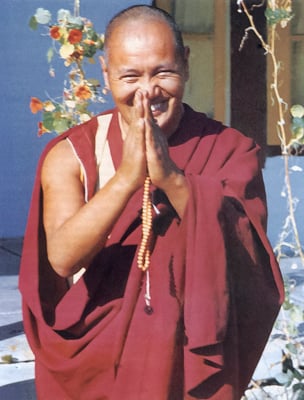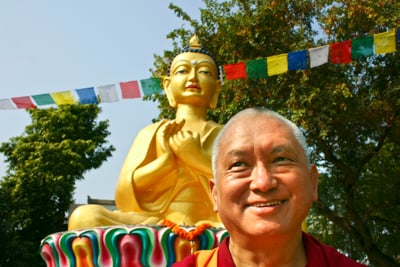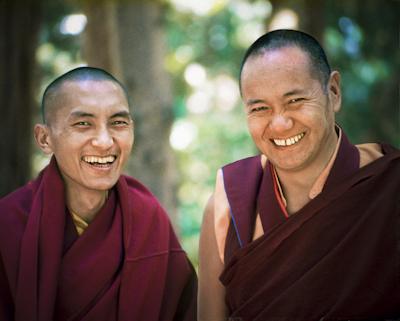Dear LYWA Friends,
Here’s our next e-letter. Thank you for receiving it.
I’m now back from Australia. Thanks to all of you who wrote kind thoughts about my mother, who at 91 is doing as well as can be expected. She’s not so good at reading or meditating any more, but we’re playing her lots of Dharma CDs—lamas chanting oral transmissions, sutras, mantras and so forth—and she seems to enjoy getting all those positive imprints.
The main news this month is about the many new additions to our website. You can always go to our home page and look at our Latest News. We’re always adding stuff.
For example, there are a number of teachings by Lama Zopa Rinpoche, including his advice to centers and study groups, a talk on rebirth and karma and a tsa-tsa commentary.

We are working on repoducing the tribute to Lama Yeshe which appeared in Wisdom magazine shortly after Lama's death in 1984. It includes an account of the days leading up to and immediately following his death, and tributes by Lama Zopa Rinpoche, Geshe Sopa, and many others.
We are continually developing the audio section of our Web site and are currently posting teachings from the Mahamudra Retreat in Australia last year, which is where this month’s previously unpublished teaching, below, comes from (see Day 23 for this teaching).
Thank you so much for your interest in and support of the Lama Yeshe Wisdom Archive.
Much love,
Nick Ribush
Director
The Preciousness of Each and Every Sentient Being
 In Calling the Guru from Afar, the great enlightened being Pabongka Dechen Nyingpo said,
In Calling the Guru from Afar, the great enlightened being Pabongka Dechen Nyingpo said,
"Thinking of this excellent body, highly meaningful and difficult to obtain, and wishing to take its essence with unerring choice between gain and loss, happiness and suffering, reminds me of you, lama."
At this time we have received the precious human body that has eight freedoms and ten richnesses, will be extremely difficult to find again and is exemplified by the story of the blind turtle that abides in the depths of a vast ocean and only once in a hundred years comes up to the surface, upon which floats a golden ring. This ring is constantly moving about, never staying in the one place, so you can imagine how hard it would be for the turtle to put its head through the ring when it comes up. Finding the perfect human rebirth is harder than that.
In this example, the turtle’s being blind represents a person’s absence of Dharma wisdom—not knowing what should be practiced and what should be abandoned—and putting its head through the ring represents entering the Buddhadharma. So, not only is the turtle blind but the ring keeps moving about. Anyway, this example illustrates how hard it is to be born human and to enter the Dharma path by taking heartfelt refuge in Buddha, Dharma and Sangha through understanding how the Triple Gem has the power to lead us to liberation from all the sufferings of samsara, and having intelligent fear of the suffering nature of samsara. As difficult as it is, this is what we have found this one time, and it has great meaning.
For the years, months, weeks and days that we have this precious human body—so meaningful yet difficult to find—we have a choice every moment of its existence: profit or loss; happiness or suffering? Every second we can choose to take its essence or not.
What Pabongka Dechen Nyingpo is saying is that not only every year, month, week, day, hour or minute, but even every second, this perfect human rebirth gives us the opportunity to make an unmistaken choice: enlightenment or hell—which one? Every second we have this choice to make.
We ourselves create the cause to be born in hell or to achieve enlightenment. Each second we’re alive we have the opportunity to extract the essence from this life: samsara or liberation? Every second we can choose which one. Instead of creating the cause of samsara we can choose to create the cause of liberation; instead of choosing hell we can choose enlightenment; instead of choosing the lower realms we can choose the upper. Our future happiness or suffering is completely in our own hands.
Putting it this way shows how this perfect human body that we have at this time is wish-fulfilling; unbelievable precious—more precious and more wish-fulfilling than skies full of wish-granting jewels. No matter how much wealth—gold, diamonds or even wish-granting jewels we have—that alone cannot fulfill our wishes; that cannot prevent us from being reborn in the lower realms or bring us to the higher realms; that cannot stop us from reincarnating in samsara; that cannot stop us from falling into the lower nirvana and bring us to the great liberation of full enlightenment.
Therefore this perfect human rebirth that we have received just this once is unbelievable precious. Even if we have only one hour left to live, even if we have only one minute left to live, even one second, by generating bodhicitta we can create the cause of enlightenment and, by the way, the cause of liberation and happiness in future lives. So even if we have only a second left to live, we still have the great opportunity to make the unmistaken choice, to take the essence from this life.
So what Kyabje Pabongka is saying is that the only reason we have all these years, months, weeks, days, hours, minutes and seconds of incredible freedom and opportunity to make the unmistaken choice, to take the essence of this precious human, is the kindness of our guru; it’s only through the kindness of our guru. Therefore, while thinking of, or wishing to, take the essence, make the unmistaken choice—remembering the difference between profit and loss, happiness and suffering—we remember our guru, that is, our guru’s kindness.
When we recall that we have received this precious human body through the kindness of our guru, we should think of the real meaning of the guru, the very essence, which is the ultimate guru, the absolute guru, and remember that all our past lives’ gurus, our present guru and all our future gurus are actually one. Even though they appear in different bodies, in reality, they’re all one. Until we reach enlightenment, they’re all one.
In the past, our gurus taught us about refuge and karma and gave us Dharma wisdom, the ability to distinguish between what we should practice and what we should abandon; they taught us how to practice morality. That led us to receive a precious human body. Then, on the basis of that, we created the cause to receive this perfect human rebirth, with its eight freedoms and ten richnesses. Through our gurus’ kindness not only have we met the Buddhadharma in general but we have also met the Mahayana Paramitayana teachings; furthermore, we have also met tantra, secret mantra, the Mahayana Vajrayana teachings. Because in past lives we took and practiced the various vows our gurus gave us, in this life we have met all three levels of the teachings of the Buddha.
Thus, it is only because of our gurus’ kindness that we have the incredible freedom to choose between happiness and suffering, profit and loss. So, in this verse, Pabongka Rinpoche is saying that while we’re thinking of, or wishing to, take the essence of this life by making the unmistaken choice, we remember our guru, which means our guru’s kindness. And all of this happens only if we devote ourselves to our guru, which essentially means following his advice, acting according to his wishes.
So, with respect to receiving gain, not loss, by following our guru, achieving the happiness of future lives and even liberation from samsara is not enough because the practices necessary for those results do not eradicate the self-cherishing thought—the mind that seeks happiness for oneself alone, which is what opens the door to all suffering, everything undesirable and all obstacles.
We’ve been seeking just our own happiness since not just the beginning of this life but from beginningless time. Because we’ve been practicing self-cherishing forever, holding this great demon in our heart, we’ve still not attained enlightenment. We haven’t even received liberation from samsara. We haven’t received any lamrim realizations. Our minds are still empty of bodhicitta. We don’t have the wisdom realizing emptiness. We have no renunciation—the very first Dharma realization we should gain through realizing the perfect human rebirth, its great usefulness and the difficulty of finding it again; impermanence and death; the suffering of the three lower realms and karma. We have none of these basic understandings of the lower scope of the path. We haven’t reached even the very first step of the path to enlightenment.
As long as this great demon of the self-cherishing thought abides in our heart, we’ll never gain any realizations, let alone liberation or enlightenment. As it has kept our mind empty of Dharma understanding in the past, so will it keep our mental continuum empty in future. Furthermore, as long as we think of our own happiness alone, we’ll continue to experience the many sufferings of samsara, especially those of the lower realms.
As the great bodhisattva Shantideva said, as long as we don’t let go of the fire we’ll keep getting burned. Similarly, as long as we don’t let go of our I, we’ll continue to suffer. Therefore, to quell our own sufferings and those of others, we must give up working solely for our own happiness and cherish others as we do ourselves.
In other words, cherishing others opens the door to all good qualities and happiness. All past, present and future happiness, realizations and enlightenment come from bodhicitta—cherishing others. Therefore, in the first chapter of the Bodhicaryavatara, Shantideva explains the skies of benefits received from bodhicitta and how they all come from the field of sentient beings—each and every sentient being—just as edible crops come from ordinary fields, which we therefore regard as very precious.
The infinite benefits of bodhicitta as taught by the Buddha are so extensive that they can never be fully explained, but they all come from each and every single sentient being—every human being, animal and insect, hell being, hungry ghost, sura and asura—every single, obscured, suffering sentient being.
Thus the precious, wish-fulfilling bodhicitta, whose benefits can never be fully explained, which brings all happiness to ourselves and numberless other sentient beings—temporary and ultimate happiness, all past, present and future happiness—arises by depending upon the kindness of each sentient being; the existence of each obscured, suffering sentient being.
Therefore each and every single sentient being is unbelievably precious. Sentient beings are most precious. As much as bodhicitta is wish-fulfilling, so too is each and every sentient being; each sentient being is a wish-fulfilling jewel. We think money is precious because we can do so much with it; it allows us to buy food and survive; there’s so much we can do with money. Similarly, even though an ordinary wish-fulfilling jewel isn’t that valuable when compared to the value of the perfect human rebirth, as I mentioned above, still, by thinking of what we can get with a wish-fulfilling jewel or with billions of dollars, we can get an idea of how precious sentient beings really are. We should consider each and every sentient being to be our own personal wish-fulfilling jewel.
To be continued in the April e-letter.
Lama Zopa Rinpoche gave this teaching at the Mahamudra Retreat, Adelaide, Australia, April 2004. It was excerpted and edited from the Lama Yeshe Wisdom Archive by Nicholas Ribush.































